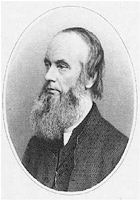Evening Hexameters Poem by Henry Alford
Evening Hexameters
Darkly the minster--towers, against the glow of the sunset,
Rise from the purple band of mist that beleaguers the city:
Golden the sky behind, into purest silver melting,
Then dissolved into azure, and arching over the zenith;
Azure, but flushed with rose, in token that day yet lingers.
Porcelain--blue in their haze, the hills watch over our dwellings;
O'er them the evening--star its pale clear beacon hath kindled.
All is calmness and silence, a scene from the happier country.
O blest shades of Eve! O gentle parting of daylight:
Masses of colour divine, all human skill surpassing!
Earthly pleasures may flit, and leave but a pang behind them:
Friends that we love may die, and their faces be past recalling:
Only an hour like this fades never away from remembrance,
Only thoughts like these track all our life with blessing.
If the sun setteth no more in the golden country of promise,
Then must all be changed,--or else were this earth more lovely!
Sunset, beautiful sunset--summer, and winter, and autumn,
Ay, and the budding springtide--what were they all without thee?
Lulling the day to sleep with all its busy distractions,
Calming the soul from toil to share the blessing of converse,
Tinting the skies with a thousand hues unknown to the daylight,
Touching the temples of earth with a coal from the fire of the altar,
Fading away into calmness, and bringing the mood of devotion:
Hail, thou time of prayer, and praise, and holy remindings!
Never does God come down on the soul, as at fall of Evening:
Fair is the rise of the Sun, and glorious the East in its kindling,
But then comes the day, and the surface of thought is ruffled;
Day, with the world, and with care, and with men's importunate faces.
Far more blessed is Eve: when all her colours are brightest,
One by one they have time to grow slowly fainter and fainter,
Fade, and fade, and fade, like music that dies in the distance:
Then still night draws on, and drops her veil over all things,
Sealing the memory up, a possession of beauty for ever.
Surely the western glow lay warm on the vaults of the temple,
When the parents came in, with the doves, the poor man's offering,
Bringing the holy Child to do as the law commanded.
Fell not the roseate light on the snow--white hair of the Ancient,
Lit it not up in his arms the soft fair flesh of the Infant,
Sparkled it not on the tear in the eye of the maiden Mother,
While like incense there rose from the depths of the satisfied spirit
``Let me depart in peace, for mine eyes have seen thy promise!'
Therefore the Church doth sing her Nunc dimittis at evening,
Evening, when all is peace, and the land of peace looks closest,
When life seems at an end, and all its troubles behind us,
And the salvation so near, that the soul yearns forth to grasp it.
Burned not the domes of the city with day's last beam in the distance,
When those two turned in, arrived at their door in the village,
When they besought Him, saying, ``Abide with us, for it is evening?''
Fell not the purpling shadows o'er rock and crumbling ruin,
As they sped joyful back to tell their tale to the mourners?
Thus doth the spirit in singing of earth, pause ever and listen,
Seeking an echo from Him, her centre of life and blessing
Thus flows forth all beauty from Him who is best and brightest.
All fair things are of Thee, thou dear Desire of the nations,
Thou art the Sun of life, and day is alone where Thou art:
Thine the effulgence there, and Thou the orb of its glory.
Set Thou never on me, best light of my soul! Be near me
In the meridian hours, the toil and heat of the noon--day:
Nor do Thou fail, when the night falls round, and the shadows enwrap me.
But by this, from the western heaven hath faded the daylight,
Vesper hath trimm'd his lamp, and the keen stars twinkle around him;
Still loom forth from the bank of mist that hath buried the city
Darkly the minster--towers; but gone is the glow of the sunset.
This poem has not been translated into any other language yet.
I would like to translate this poem